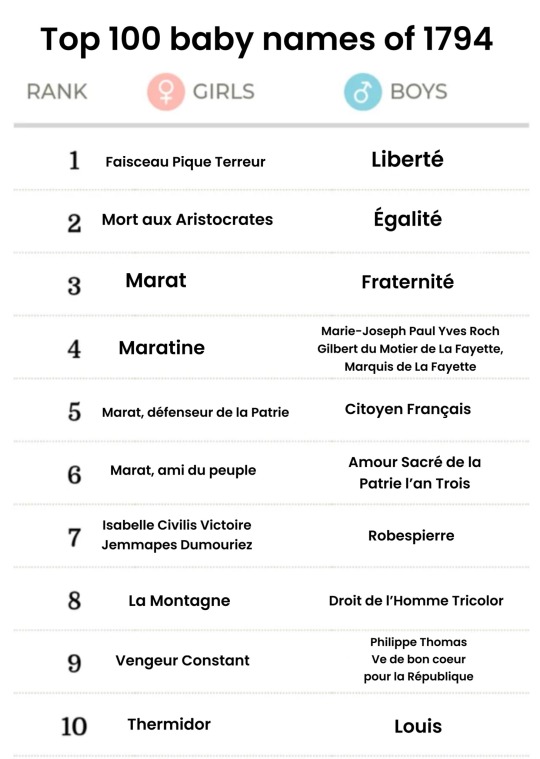Text
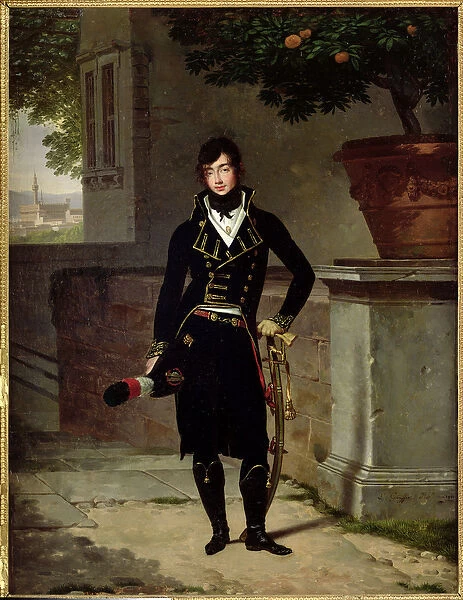
Portrait of an Officer of the Cisalpine Republic (1801) by Louis Gauffier
61 notes
·
View notes
Text
The National Convention: parliamentary violence, Phrygian caps and an anecdote about Bourdon de l'Oise.
16 notes
·
View notes
Text

Anime Enjolras so real for that
621 notes
·
View notes
Photo
Welp, I found a second wig "NOPE" after SJ.
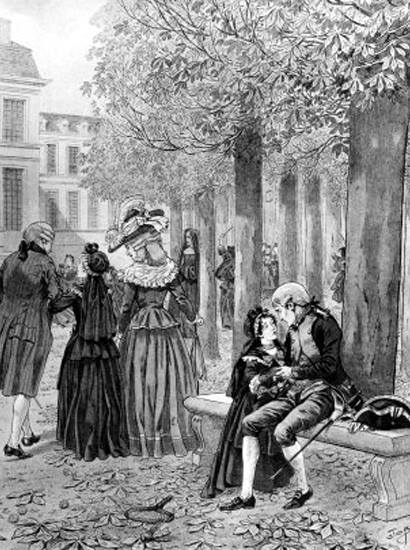
Napoleon’s powdered hair brought all the weird little women to the yard.
51 notes
·
View notes
Text
reading about Goujon is such a rewarding experience, just last night i opened a biography of his to a random page and learnt he helped a wounded soldier on a battlefield by giving up his horse for him to ride. he then declined public praise from people who had seen this happen and he himself never talked about it
31 notes
·
View notes
Text
Genuinely 90% of historical fiction would be so much better if more writers could get more comfortable with the fact that to create a good story set in a different time period you do actually have to give the characters beliefs & values which reflect that time period
31K notes
·
View notes
Text
😍
He's perfect! Thank you!!! 😭



@lohinen @major-knighton @frevandrest very late but here are the frenchmen you requested!
Lindet, Fouché, Hérault de Séchelles
thank you so much!!
#love the other two#but oh my#he is so cute#and mischeviously full of himself#art#frev#hérault#fouché
48 notes
·
View notes
Note
10, 13, and 26 for history asks :D
10. Pieces of art ( paintings, sculpures, lithographies, ect.) related to history you like most ( post an image of them)
Self-Portrait of Boilly as a sans-culotte:


13. Something random about some random historical person in a random era.
This will be more about the present but hear me out. Nikola Tesla was cremated and his ashes rest in a spherical urn in the Nikola Tesla museum, Belgrade (Serbia). There is a HUGE controversy in Serbia over this, because it's seen as an inappropriate burial for such a huge figure of national pride. But the museum doesn't want to give the urn to the church, so there are periodical protests/fights/controversies over it, particularly near the elections, when there is a need to score political points over Tesla's remains.
26. Forgotten hero we should know about and admire?
Already answered with Michel Lepeletier, so now maybe Félix Lepeletier. Not as heroic, but I love a reformed himbo.
17 notes
·
View notes
Text
"And what shall be the reward of spilling so much blood, one drop of which has more worth than all the crowned heads of the world?"
L’Ami du Peuple, No 634, from Thursday 19th April 1792.
[The very next day, on the 20th April 1792, war was declared against Austria]
If it was still impossible to doubt the traitorous dispositions of the court, after all the plots that it has formed to this day, in order to crush the people, to ruin the nation, and to re-establish despotism, the scene of high scandal that the ministerial cabinet has just been playing out should have sufficed to open the eyes of all.
On the 14th of this month, the ministers presented themselves in the Assembly. The Minister of Foreign affairs [Dumouriez; he took this post on 15th March 1792] took the floor to communicate to them, after the orders of the king, of the dispatches that, he said, were delivered by an extraordinary courier who arrived during the night. He first read out the letter written [by Louis XVI] to sieur [Louis Marie Antoine, Vicomte de] Noailles, ambassador at the court of Vienna, demanding the new king of Hungary [Franz II of the Holy Roman Empire, nephew of Antoinette] to give a categorical response on his attitudes towards France. He then read out the response of sieur Noailles, containing a formal refusal to continue a negotiation that he [Noailles] said was impracticable and an announcement of his [Noailles’s] resignation. He [Dumouriez] proceeded to give a reading of a very pressing dispatch [from Louis XVI] addressed to sieur Noailles. Finally, he [Dumouriez] announced that Louis XVI had just written in his own hand a letter to the king of Hungary, and sieur Molle the field marshal was to deliver it. The response to this letter would arrive on the 10th of next month at the latest and would decide whether peace or war would be. In this epistle, one can clearly sense that Louis XVI is repeating his crude joke of professing his love for the Constitution.
Scarcely had these readings been finished than sieur Briche and sieur Guadet demanded a decree of indictment against sieur Noailles for having disobeyed the orders of the king; they must say so, for he had betrayed the interests of the nation and compromised public safety. After several light debates, this decree was given a near-unanimous pass. Already the ones that did not follow the thread of the story were singing to their victory, for they saw that he was declared a nation-harming (lèse-nation) criminal, he who is an ambassador of France, a close relative (cousin-germain) to sieur Motier [Noailles and Lafayette had the same father-in-law], a member of the Tuileries committee, and a pillar of the Feuillant club; that is to say, one of the main conspirators, bolstered by all the forces of his accomplices, and sure of the support of the vast majority of counter-revolutionary conscript fathers. But their joy was short-lived. Several hours after the decree of indictment, the veil was ripped to lay bare the juggleries of the ministerial cabinet. Sieur Dumouriez appeared on stage to announce to the president a letter that he had allegedly just received from sieur Noailles, who had finally obeyed the orders of Louis XVI and had given news that the king of Hungary refused all negotiations, declaring war on the French nation.
Immediately Thuriot, Goupilleau, Vaublanc, Gentil, Dumas *and the other gangrenous ministers demanded that the decree of indictment be revoked. Sieur Kersaint and Sieur Delacroix ⁑ proposed that the letter of the minister [Dumouriez] and the dispatch of the ambassador be sent back to the diplomatic committee, so that the report would be done on time.
The report done, under the name of the committee, by sieur Lasource, the decree of indictment was adjourned. Such was the conclusion of the ministerial and senatorial farce against sieur Noailles. Thus, by the method of a double correspondence, the perfidious agents of the prince will always get away with their deeds, just like how pirates escape by the method of using false flags. Always the artifices of the court will render the laws illusory; always the apparent acts of justice from the legislator will be none but lures to deceive the people; and no matter how things turn out, always the public enemies at the helm of the vessel of the State will manage to throw it at the reefs, and to direct it in such a way as that shall see it broken by the storm and engulfed by the waves in the end.
So finally here is war declared on the French by the powers plotted against freedom. However, who does not see that all these pretend ministerial negotiations with foreign courts had no other goal than to amuse the nation and to buy time, until all these powers have their batteries loaded, and they are ready to shoot us? Who does not see that all these bellicose preparations, arranged by the Assembly, had no other goal than to lure the nation to sleep in deep dreams of security? Who does not see that all these sending-back to the executive power, the denunciations, the prevaricating ministers, and these complaints of citizen soldiers crammed onto the frontiers and left without munitions, without weapons, without clothes, without pay, had no other goal than to leave the patrie with no means of defence, to leave the State in the grip of the machinations of the court, of the undertakings of the fugitive plotters, of the attacks of the foreign lackeys.
Will there be war? Everybody is saying yes. It is certain that this opinion has finally prevailed in the cabinet, after the representations of sieur Motier who, without doubt, has made it the only way in order to distract the nation from the concerns within to occupy with concerns without, in order to make the nation forget the internal dissensions in favour of news in gazettes, in order to dissipate the national property into military preparations, instead of employing it to liberate the State and to comfort the people, in order to crush the Nation under the feet of taxes, and in order to slit the throats of patriots of the infantry and of the citizen army, leading them to the butcher’s, under the pretext of defending the barriers of the empire.
It is always certain that he pressures the monarch to stop negotiating and to order the campaign to be started, which he regards as a means to honourably end his own career, if he runs out of ways to regain the nation’s confidence with new acts of seduction and of hypocritical devotion to the cause of liberty.
Lost in the heady rhetoric from Brissot, from Lemontey, from Girardin, from Delacroix, from Gouvion, from Dumas and from other scoundrels who have sold themselves to the court, seduced by a false image of national forces, intoxicated by the fumes of Gallic boastfulness, the people seem no less desiring for war than their implacable enemies do. For three years I have represented war as the last resort of counter-revolutionaries and I have not stopped working to thwart the various undertakings of the cabinet to set it aflame. Since then, my attitude has not changed, and in my eyes, war is always the cruellest curse that may be cast on the kingdom. Whatever new focus that war will draw public attention to, by only fixing it onto news in gazettes, war will leave an open field for the enemies within to machinate at their ease and to breathe the fire of civil dissensions into all parts of the kingdom, to instigate troubles, and to set traps for proponents of freedom; the war will completely squander the national property and accelerate public bankruptcy; the war will consummate the loss of everything that France has in good citizens and it will drain the State of all the patriotic youth, because it is the most zealous proponents of the revolution who have been rushing to the defence at the frontiers, and they will always do so.
However fearless they may be, they are without weapons ¹, without discipline, without tactics, without idea of grand manoeuvres ², without the smallest notion of the art of war, without experienced chiefs, without shrewd and faithful generals. How would the soldiers of the patrie resist the attacks from the disciplined armies of lackeys, they who are commanded by shrewd generals?
If war happens, I repeat, regardless of the bravery of the defenders of freedom, it does not take an eagle-eyed genius to foresee that our armies will be crushed in the first campaign.
I can conceive that the second campaign would be less disastrous and that the third could even be a glorious success, since it is impossible that we would not learn at our own expense, impossible that some great man would not be given a position. Yet, to wrest victory from our enemies, we will need to suffer a long and disastrous war. Now, it would fall short of the truth, to say that our losses, over three campaigns, shall round to a billion livres and five hundred thousand combatants.
How shall we compensate for the loss of so many brave soldiers, the flower of the French citizens? And what shall be the reward of spilling so much blood, one drop of which has more worth than all the crowned heads of the world? To prevent this precious blood from being shed, I have proposed for a hundred times an infallible method, which is to take hostage among us Louis XVI, along with his wife, his son, his daughter, his sisters ⁂, and hold them accountable to what happens. A senate faithful to the patrie will speak to him thus: “King of the French, it is in vain that you (vous) hide in the detours of a tortuous policy to see us ensnared in the disasters of war; you have no escape from the avenging power of the people. We declare to you, in the name of the nation, who is your august sovereign, that we do not wish to deal with your fellowmen, the princes of Europe, that we wish to make no preparations at all for war. Whether or not you compromise with them is your choice. The duty to remind your rebellious brothers and cousins is upon you, and so is the duty to divert your fellowmen from all hostile undertakings. The barriers of the State will stay open, yet rest assured that upon certain news that the first corps of enemies shall have crossed them, your culpable head will roll at your feet, and your entire dynasty shall be extinguished in its own blood.”
But a senate faithful to the patrie is even rarer than a patriotic king. How insensible the people is, that they do not sense the necessity to finally choose a supreme dictator, to give him powers that would be circumscribed, so that he would have no authority to dominate, but unlimited authority to cut down the chief conspirators that the public voice has identified, to force the corrupt legislator to put at a price the heads of kings, of princes and of the generals who will come with weapons against us, to offer sums of gold to their troops who will deliver these kings, princes, and generals to us, living or dead, and to receive these troops among children of the State. Soon we shall see their numerous legions, running with weapons and equipment under the flags of freedom, and France shall be delivered from her enemies forever.
The fate that awaits her is less consoling for the friends of the patrie, but the fate that awaits her enemies will be terrible.
At the first shot of the canon fired on the frontier, the departments agree on a plan to reduce the castles and the gardens to ashes and to slit the throats of all public enemies who can be found in cities and in the countryside. As the army will massacre its own perfidious chiefs and conspiratorial generals, and as the entire nation will rise up against its own worthless representatives to seize back the powers that they have stripped from her, the mysterious veil long hung over the intrigues of the cabinets will be torn: however impatient the cabinets are to put the French back into chains, I strongly doubt that Louis XVI shall have the humour to do nothing if he even takes a look at this terrible picture. Let some good man have the courage to put it before his eyes.
---------------------------
Notes in the original:
[1] It is an unchanging fact that sieur de Grave, despite all his civic affectations, has not given a single order to prompt the ministry to arm the national guards of the frontiers since he arrived at the ministry. It is upon their actions, and not upon their talk, that the royal agents must be judged.
[2] It was to prevent the citizen battalions from training for grand manoeuvres that the generals have kept them divided and dispersed into different posts.
Translator's notes:
*This would be Mathieu Dumas (1753 - 1837), a colonel of the general staff of Paris, long lambasted by Marat for refusing to fight, and whose name had come from his father, and not to be confused with Thomas-Alexandre Dumas (1762 - 1806) the Haitian general, whose name had come from his mother, an enslaved and nigh-erased woman.
⁑ This would be Jean-François Delacroix (1753 - 1794) the Dantonist, not to be confused with Charles-François Delacroix (1741 - 1805) the Thermidorian, and father to the painter Eugène Delacroix (1798 - 1863).
⁂ Marat notably did not mention either of the brothers of Louis XVI, because the comte de Provence (future Louis XVIII) emigrated in June 1791 to the Austrian Netherlands, and the comte d’Artois (future Charles X) emigrated even earlier, on 17th July 1789 to Savoy.
I am indebted to @citizen-card for helping me with finding out about the relation between Motier and Noailles, and to @lamarseillasie for making me interested on "just what was Marat's view on dictatorship" in the first place.
33 notes
·
View notes
Text
speaking of underrated historical figures you know who never gets featured in frev stuff ever?? augustin robespierre. i swear you could watch all the most popular frev movies and not even know maximilien robespierre HAD a brother. much less that that brother was at least somewhat important. didnt even merit an ALLUSION in the new napoleon movie even though it showed that bizarre version of thermidor. in lrf he is just physically not present when he should be. he might not have been the most notable politician but... that even the incredible courage and loyalty of his decision to share his brother's fate is so forgotten even in accounts that center his brother... it's a little heartbreaking to me
90 notes
·
View notes
Text
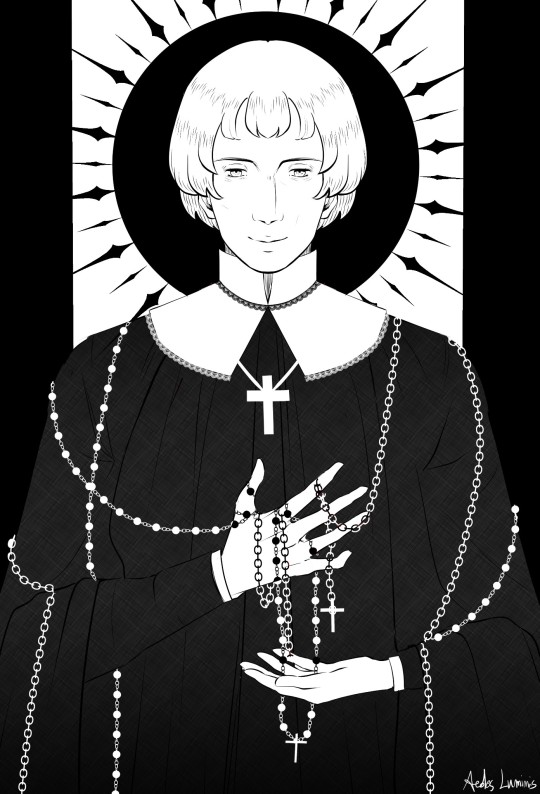
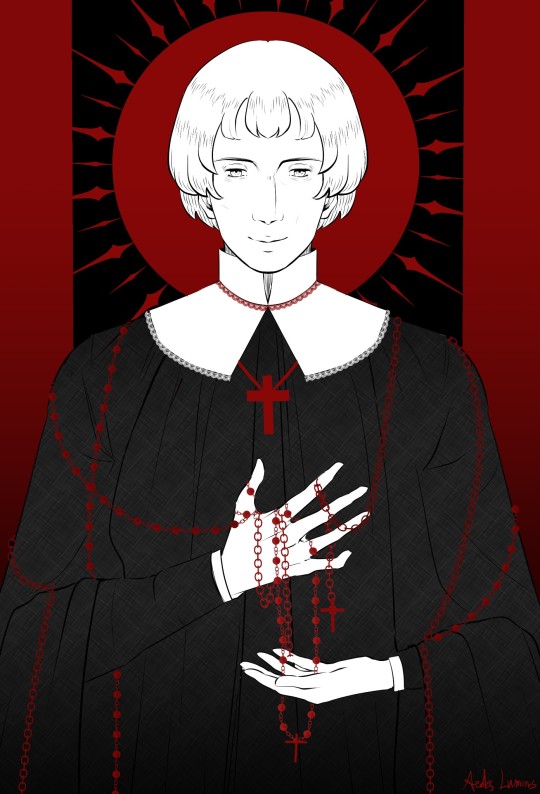
It's Friday: time to confess your sins to father Joseph.
94 notes
·
View notes
Note
(History ask game) 14, 28, 29
14. Why you are interested in history ( a silly question, eh?) ?
I don't really know. I always liked different eras (but specific ones - I have major interests and major "nah, don't care about it" so I wouldn't make a good historian).
On a more pathetic note, I never really fit into my own era so maybe this is why history interests me so much. ?
28. Favourite “dream team” of specific era or the entire history?
I am dumb. Not sure what they mean by this. I will interpret it as a "group of 5 players" and my chosen era is frev.
Look. Look. Nothing I could arrange could even come near to the absolute mess they organized themselves in frev.
But let me try:
Robespierre, Marat, Saint-Just, Michel Lepeletier, Goujon
But hey, not saying that it would work.
29. Great historical mystery you are interested in?
Already answered. WTF was the Foreign Conspiracy in frev and was there a mole in the CSP. Not a great mystery but it is to me lmao.
4 notes
·
View notes
Note
for the questionnaire shit, number 2, 4 and 5? And whichever you really want to answer that no one has asked yet
2. What is your country most famous for in history?
Disclaimer first: I am not sure what my country is. I have a mega complex relationship with this, because I was born in former Yugoslavia and it doesn't exist anymore, and I never got used to the new program, so... If you allow me to answer with a country that doesn't exist anymore.
Unfortunately (and unfairly, imo) it is mostly infamous because of the wars, but there are good things about Yugoslavia - great things, even. Not sure if the wider world TM knows about them, though.
So maybe it's not famous, but it should be: Yugoslavia was one of the founders of the Non-Aligned Movement in 1961.
4. Favourite historical era?
Already answered. Basically, give me 18th century mess and I am happy (and shocked and appalled and everything in between).
5. Favourite weapon?
Hmm... Not really knowledgeable about weapons. Maybe crossbow?
No one asked #27 yet, but let's see if someone does. If not, I'll update this one. :)
6 notes
·
View notes
Note
10 + 13 for the history asks game?
10. Pieces of art ( paintings, sculpures, lithographies, ect.) related to history you like most ( post an image of them)
It is not my favourite history-related art but I just love my header. It captures the vibe of the whole thing perfectly:
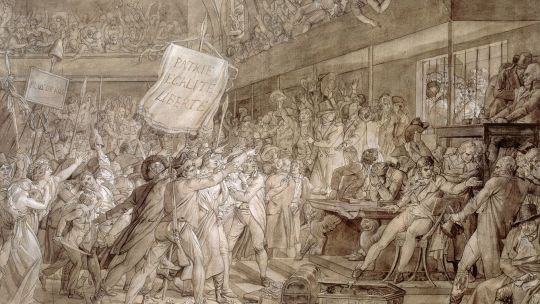
Le 10 août 1792 by François Gérard
13. Something random about some random historical person in a random era.
(In)famous castrato Caffarelli once had to hide in a cistern from a jealous husband who almost caught him banging his wife. He later whined that the incident made him catch a cold and affect his amazing voice.
And this is, like, one of the least outrageous things that happened to this dude.
Thank you for asking!
13 notes
·
View notes
Note
4,7,9,24,25,26,29 from here ^_^
4. Favourite historical era?
I seem to be drawn to French and Mediterranean history, and 18th century in particular. French Revolution of course, but anything 18th century it seems. They were so messy it's irresistible. The pettiness, the decadence, the "wtf dude" anecdotes...
I think it's because 18th century is a curious era where the world starts to resemble the one we live in, but it's also completely different. The origins of "our world" so to speak (for better or worse).
Also, I love history of science in general. Not that it's an era, but still.
Honourable mention: Ancient Greece high Middle Ages (idk if it's still a correct way to call it that), 16th century France
7. Historical dressing, uniform or costume?
Hmm not sure what they mean by this. Favourite clothing style/item?
I must admit I am feral for 1790s style men's coats. Those were a perfection. The high collar, the shape... Everything.
I also love late 18th century corsets and soo wish to get one but the best replicas are like 500 dollars. :(
Also, not strictly favourite but I love Directoire uniforms unironically. If anyone makes a frev themed Halloween party you just know I am dressing up like this:

9. Favourite historical film?
This is easy! Not the best by any measure, but "La Reine Margot" (1994) was my everything when I was 13 and no other historical film ever made me bi impressed like this one.
24. Most underrated historical figure?
25. Most overrated historical figure in your opinion?
I legit need to think about this. It's difficult for me to gauge who is underrated and who is overrated. Edison was super overrated but this is luckily changing (go Nikola Tesla!) Maybe they can be the answers to this question.
26. Forgotten hero we should know about and admire?
The first one that comes to mind is Michel Lepeletier. I suppose there are many others but he is the first one I thought about. Probably because I am the first guilty of almost forgetting about him.
But I am sure there are others I can think of.
29. Great historical mystery you are interested in?
Ooh here, too, I need to figure out what is known as a historical mystery. There are so many but I am blanking at the moment.
Anyway, not a colossal mystery but I really (really really) want to know if there was truly a Foreign Conspiracy in frev started out by baron Batz (and other royalists?) and wtf that whole mess was about. (Including, of course, was there a mole in the CSP and if yes, who was it?)
Thank you for asking! :)
5 notes
·
View notes
